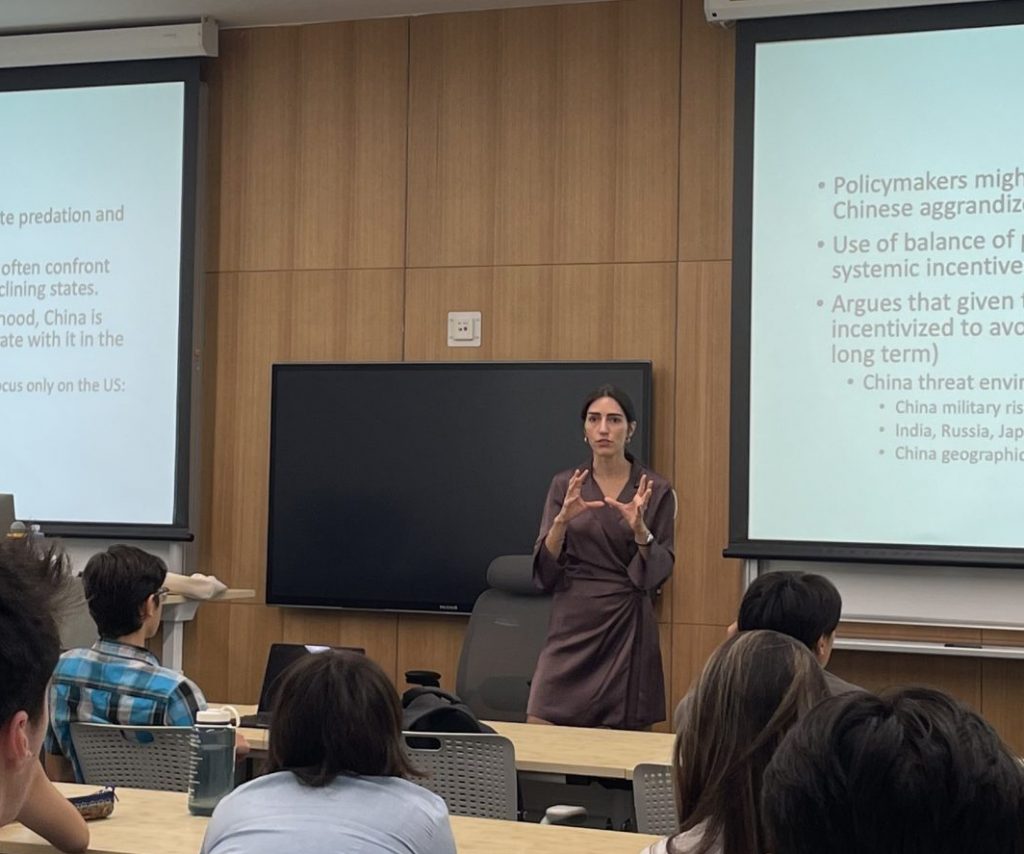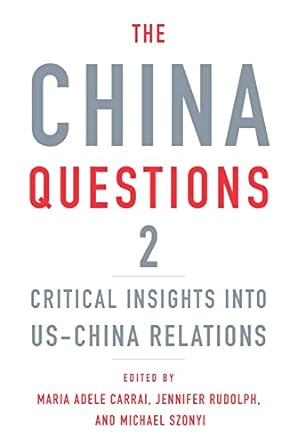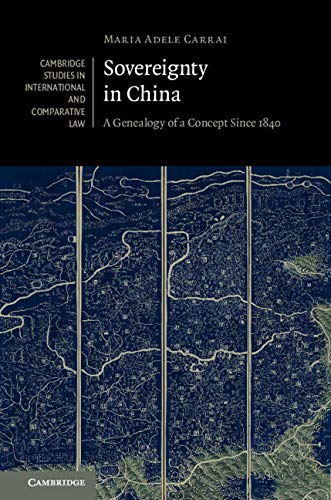Maria Adele Carrai

Maria Adele Carrai is an Assistant Professor of Global China Studies at NYU Shanghai. Her research explores the history of international law in East Asia and investigates how China’s rise as a global power shapes norms and redefines the international distribution of power. She co-leads the Research Initiative ‘Mapping Global China,’ and is the author of Sovereignty in China. A Genealogy of a Concept since 1840 (CUP 2019) and co-editor of The China Questions 2 – Critical Insights into US-China Relations (HUP 2022).
Before joining NYU Shanghai, she was a recipient of a three-year Marie-Curie fellowship at KU Leuven. She was also a Fellow at the Italian Academy of Columbia University, Princeton-Harvard China and the World Program, Max Weber Program of the European University Institute of Florence, and New York University Law School.
For decades Americans have described China as a rising power. That description no longer fits: China has already risen. What does this mean for the US-China relationship? For the global economy and international security? Seeking to clarify central issues, provide historical perspective, and demystify stereotypes, Maria Adele Carrai, Jennifer Rudolph, and Michael Szonyi and an exceptional group of China experts offer essential insights into the many dimensions of the world’s most important bilateral relationship.
Ranging across questions of security, economics, military development, climate change, public health, science and technology, education, and the worrying flashpoints of Hong Kong, Taiwan, and Xinjiang, these concise essays provide an authoritative look at key sites of friction and potential collaboration, with an eye on where the US-China relationship may go in the future. Readers hear from leading thinkers such as James Millward on Xinjiang, Elizabeth Economy on diplomacy, Shelley Rigger on Taiwan, and Winnie Yip and William Hsiao on public health.
The voices included in The China Questions 2 recognize that the US-China relationship has changed, and that the policy of engagement needs to change too. But they argue that zero-sum thinking is not the answer. Much that is good for one society is good for both—we are facing not another Cold War but rather a complex and contextually rooted mixture of conflict, competition, and cooperation that needs to be understood on its own terms.
A fresh, lively and insightful book that can be read by student and specialist alike in search of a synoptic view of the relationship.
—John Delury, Global Asia
A timely book. For general readers and students alike, these concise essays on critical aspects of the US-China relationship work very well. An impressive roster of authors collectively provides a broad overview of the many aspects of the relationship, going well beyond diplomacy and politics. The essays also work beautifully by themselves.
—Odd Arne Westad, author of Empire and Righteous Nation: 600 Years of China-Korea Relations
Focusing on the turbulent bilateral relationship between China and the United States, The China Questions 2 offers a wide range of accessible essays on topics from international relations to culture, in a tone that is lively and argumentative but always balanced. Overall, the book has a powerful message: the United States needs informed and clear-eyed engagement with China.
—Rana Mitter, author of China’s Good War: How World War II Is Shaping a New Nationalism
Required reading. The authors are a who’s who of American scholars on US–China relations, and the topics include virtually everything that would be of concern to students, academics, and practitioners. At a time when there are too few books on the relationship generally, this fills a wide gap. The editors have my admiration.
—Stephen A. Orlins, President of the National Committee on United States–China Relations
This book provides a comprehensive history of the emergence and the formation of the concept of sovereignty in China from the year 1840 to the present. It contributes to broadening the history of modern China by looking at the way the notion of sovereignty was gradually articulated by key Chinese intellectuals, diplomats and political figures in the unfolding of the history of international law in China, rehabilitates Chinese agency, and shows how China challenged Western Eurocentric assumptions about the progress of international law. It puts the history of international law in a global perspective, interrogating the widely-held belief of international law as universal order and exploring the ways in which its history is closely anchored to a European experience that fails to take into account how the encounter with other non-European realities has influenced its formation.
‘The Confucian admonition that one needs to study the past to understand the present is especially apt when it comes to China and sovereignty. Fortunately, Dr Maria Adele Carrai’s new book provides a superb genealogy of Chinese approaches to sovereignty over time, from historic times to the present, that will be a key departure point on this important topic for years to come.’
—William P. Alford – Jerome A. and Joan L. Cohen Professor of East Asian Legal Studies and Director of East Asian Legal Studies, Harvard University, Massachusetts
‘Carrai’s innovative conceptual history of ‘sovereignty’ in China explores the changing meanings of international law and its structures of authority and legitimacy through three periods of dramatic Chinese political transition. This is a study not only of Chinese reception and adaptation. It provides a foundation for scrutiny of China’s active participation in shaping our present international legal order.’
—Madeleine Zelin – Dean Lung Professor of Chinese Studies, Columbia University, New York
‘This is a stimulating, learned, and readable analysis of the many uses the malleable concept of ‘sovereignty’ has served in China’s relations with the world for almost two centuries. It offers invaluable assistance for parsing the rhetoric of both Xi Jinping and Donald Trump in the current East-West contest for domination.’
—Jerome A. Cohen – Faculty Director of US-Asia Law Institute, New York University
‘This study provides a much-needed concise history of the genealogy of sovereignty as a central concept of modern international law and politics in the context of Chinese transformation and Sino-foreign encounters since the mid nineteenth century. Its nuanced analysis of Chinese specificity and agency in shaping international legal and political history will be of great interest to scholars of China, comparative politics, and international history.’
—Li Chen – University of Toronto


